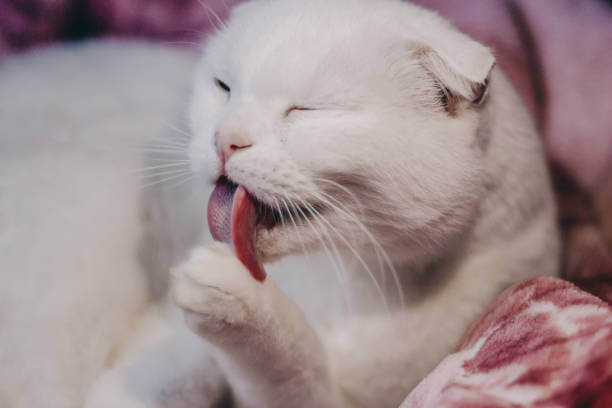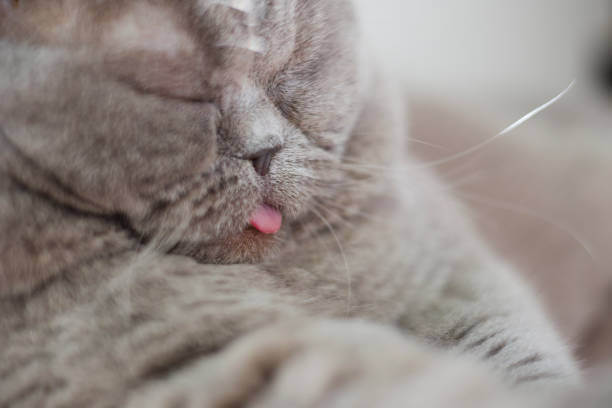As cat owners, we adore our feline companions and strive to keep them healthy and happy. Your Cat Has a Swollen Lip? So, when we notice something out of the ordinary, like a swollen lip, it can be quite alarming. But fear not! In this article, we will explore the possible reasons behind your cat’s swollen lip and provide guidance on how to take appropriate action. Remember, while this information is valuable, it is always crucial to consult with a veterinarian for an accurate diagnosis and tailored treatment plan.
Common Causes of Swollen Lips in Cats

There are several potential causes for your cat’s swollen lip. Understanding these causes can help you determine the best course of action:
Allergic Reactions
Cats can have allergic reactions just like humans do. They may come into contact with an allergen that leads to swelling around their lips. Common allergens include certain plants or flowers, insect bites or stings, certain foods (such as fish or dairy), or even household chemicals.
Dental Issues
Dental problems are another common cause of swollen lips in cats. Periodontal disease, tooth abscesses, or gum infections can lead to inflammation around the mouth area. If your feline friend has been experiencing bad breath or difficulty eating, dental issues could be the culprit.
Infections
Infections caused by bacteria or viruses can also result in swollen lips in cats. Feline herpesvirus is one such viral infection that commonly affects cats‘ lips and eyes. Bacterial infections may occur due to wounds or scratches on the lip that become infected over time.
Insect Bites or Stings
Similar to humans, cats can experience localized swelling from insect bites or stings. Bees, wasps, spiders, or even mosquitoes can cause a reaction resulting in a swollen lip. Now that we’ve covered the potential causes, let’s discuss how to react when you notice your cat’s swollen lip.
Taking Action: What to Do When Your Cat Has a Swollen Lip

Discovering that your cat has a swollen lip can be concerning, but there are steps you can take to help your furry friend. Here’s what you should do:
Assess the Situation
Start by examining your cat’s overall behavior and health. If they seem otherwise normal, eating well, and displaying no signs of distress or difficulty breathing, you may not need to panic. However, if your cat is exhibiting other symptoms like lethargy, loss of appetite, or respiratory issues along with the swollen lip, it is crucial to seek veterinary attention immediately.
Inspect the Area
Carefully examine your cat’s lip for any visible signs of injury or irritation. Look for scratches, wounds, or any foreign objects that may have caused the swelling. If you spot something unusual or if the swelling appears severe and painful, contacting your veterinarian is recommended.
Cleanliness is Key
Maintaining good oral hygiene for cats is essential for overall health. Regular brushing and dental check-ups can help prevent dental issues that could lead to swollen lips. Ensure that your cat has access to clean water at all times and a balanced diet appropriate for their age and specific dietary needs.
Minimize Potential Allergens
If you suspect an allergic reaction as the cause of the swollen lip, try to identify potential allergens in your cat’s environment. Remove any plants or flowers that may be toxic to cats from their reach. Additionally, ensure that their food does not contain any known allergens. If necessary, consult with a veterinarian about switching to hypoallergenic diets.
Consult with a Veterinarian
While some cases of swollen lips may resolve on their own within a day or two, it is always advisable to consult with a veterinarian for proper diagnosis and treatment. A professional can assess your cat’s overall health, identify the underlying cause of the swelling, and prescribe appropriate medication or recommend further tests if needed.
How Do You Treat a Cat With a Swollen Lip?
The best way to treat a cat with a swollen lip depends on the underlying cause. If the swelling is due to an allergic reaction, eliminating potential allergens from your cat’s environment and switching them to a hypoallergenic diet may be recommended by your veterinarian. For dental issues, brushing your kitty’s teeth regularly and getting regular dental check-ups can help reduce the risk of infection and inflammation.
Overall, it’s important to take action as soon as you notice your cat has a swollen lip. Keeping an eye on their behavior, inspecting the area for signs of injury or irritation, and consulting with a veterinarian can help ensure your furry companion is getting the proper care they deserve. Taking these steps can help ensure your cat is happy and healthy!
Final Thoughts
Swollen lips in cats can be caused by a variety of conditions, including allergic reactions, dental issues, infections, and insect bites or stings. Assessing your cat’s overall behavior and health is the first step. You should also inspect the area for any visible signs of injury or irritation. Cleanliness is key to oral hygiene and minimizing potential allergens can help reduce the risk of an allergic reaction. Ultimately, no matter the cause, it is advisable to consult with a veterinarian for proper diagnosis and treatment. Taking these steps can help keep your cat happy & healthy!
It’s important to note that cats can be prone to developing swollen lips throughout their lifespan. Keeping an eye out for any changes in behavior or swelling around the mouth area will help you identify potential issues and provide the care they need. With proper treatment and early detection, your cat can make a speedy recovery. So don’t hesitate to take action if you notice any changes in your feline friend!
You can also help protect your cat from developing swollen lips by providing regular check-ups with their veterinarian – especially if they are prone to allergies or dental issues. Preventative care can go a long way in keeping your cat healthy and safe.
FAQS
Q: What are the most common causes of swollen lips in cats?
A: The most common causes of swollen lips in cats include allergic reactions, dental issues, infections, and insect bites or stings.
Q: How should I react if I notice my cat has a swollen lip?
A: If you notice your cat has a swollen lip, start by assessing their overall behavior and health. Inspect the area for any visible signs of injury or irritation. Maintaining good oral hygiene, minimizing potential allergens, and consulting with a veterinarian can help ensure your furry companion is getting the proper care they deserve.
Q: What can I do to prevent my cat from developing swollen lips?
A: You can help protect your cat from developing swollen lips by providing regular check-ups with their veterinarian – especially if they are prone to allergies or dental issues. Additionally, maintaining good oral hygiene and minimizing potential allergens can help reduce the risk of an allergic reaction.
Q: Is it safe to use a cold compress on a cat with a swollen lip?
A: Yes, placing a cold compress on the affected area can help reduce pain and inflammation for cats with insect bites or stings. However, you should always consult with your veterinarian before taking any action. They will be able to assess your cat’s overall health and provide appropriate treatment options for the best possible outcome.
Conclusion
It’s important to take action as soon as you notice your cat has a swollen lip. Keeping an eye on their behavior, inspecting the area for signs of injury or irritation, and consulting with a veterinarian can help ensure your furry companion is getting the proper care they deserve. Cleanliness is key to oral hygiene and minimizing potential allergens can help reduce the risk of an allergic reaction.
You can also help protect your cat from developing swollen lips by providing regular check-ups with their veterinarian – especially if they are prone to allergies or dental issues. Preventative care can go a long way in keeping your cat healthy and safe! With proper treatment and early detection, your cat could make a speedy recovery. So don’t hesitate to take action if you notice any changes in your feline friend!
